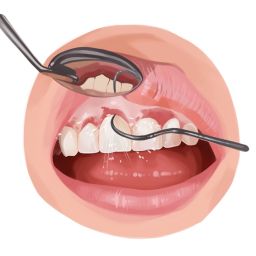Gum bleeding can be a concerning issue that many people experience but often ignore. However, understanding the underlying causes of gum bleeding is crucial for maintaining oral health and preventing more serious conditions such as gum disease. In this comprehensive guide, we’ll delve into the various factors contributing to gum bleeding, explore the different types of gum disease, and discuss effective solutions to address this common dental concern. Join us on this journey to better oral health as we unravel the mysteries behind why your gums bleed.
Understanding Gum Bleeding: A Common Symptom
Gum bleeding is often the first sign of underlying issues within the oral cavity. It can manifest during activities such as brushing, flossing, or even eating. While occasional bleeding may not seem alarming, persistent or excessive bleeding warrants attention as it may indicate the presence of gum disease.
Causes of Gum Bleeding
Poor Oral Hygiene: Neglecting regular brushing and flossing allows plaque, a sticky film of bacteria, to accumulate along the gumline and teeth. Over time, this plaque hardens into tartar, leading to irritation, inflammation, and eventually gum bleeding.
Gingivitis: Gingivitis is the mildest form of gum disease and is characterized by inflamed, swollen gums that bleed easily. It is primarily caused by poor oral hygiene habits and can be reversed with proper dental care.
Periodontitis: If left untreated, gingivitis can progress to periodontitis, a more severe form of gum disease. Periodontitis involves the destruction of the tissues and bone that support the teeth, leading to gum recession, tooth mobility, and even tooth loss.
Medical Conditions: Certain systemic conditions such as diabetes, leukemia, and vitamin deficiencies can also contribute to gum bleeding by compromising the body’s ability to fight infection and heal tissues.
Recognizing the Signs of Gum Disease
Aside from gum bleeding, there are several other signs and symptoms that may indicate the presence of gum disease:
- Persistent bad breath
- Swollen or tender gums
- Receding gumline
- Loose or shifting teeth
- Pus between the teeth and gums
Preventing Gum Bleeding: Tips for Maintaining Healthy Gums
Maintaining optimal oral hygiene is key to preventing gum bleeding and gum disease. Here are some essential tips to keep your gums healthy:
- Brush Twice Daily: Use a soft-bristled toothbrush and fluoride toothpaste to brush your teeth for at least two minutes each time, focusing on all surfaces of the teeth and along the gumline.
- Floss Regularly: Clean between your teeth and along the gumline with dental floss or interdental brushes at least once a day to remove plaque and debris that your toothbrush may miss.
- Schedule Regular Dental Check-ups: Visit your dentist at least twice a year for professional cleanings and comprehensive oral exams. Your dentist can detect early signs of gum disease and provide appropriate treatment.
- Maintain a Healthy Lifestyle: Eat a balanced diet rich in fruits, vegetables, and lean proteins, and limit sugary snacks and beverages. Avoid smoking and excessive alcohol consumption, as these habits can contribute to gum disease and other oral health issues.
- Manage Stress: Stress can weaken the immune system and increase the risk of gum disease. Practice stress-reduction techniques such as deep breathing, meditation, or yoga to promote overall well-being.
Treatment Options for Gum Disease
If you’re experiencing gum bleeding or other signs of gum disease, it’s essential to seek prompt treatment from a qualified dental professional like Dr. Bharti Tomar at AestheticDentist.clinic. Depending on the severity of your condition, treatment options may include:
- Professional dental cleaning to remove plaque and tartar buildup
- Scaling and root planing to deep clean the pockets between the teeth and gums
- Antibacterial mouth rinses or topical medications to control infection and inflammation
- Surgical interventions such as gum grafting or flap surgery for advanced cases of periodontitis
Gum bleeding is not a symptom to be taken lightly, as it can indicate underlying issues such as gum disease that require timely intervention. By understanding the causes of gum bleeding and adopting preventive measures, you can maintain healthy gums and preserve your overall oral health. Remember to prioritize regular dental visits and seek professional treatment if you experience persistent gum bleeding or other concerning symptoms. With proper care and guidance from experts like Dr. Bharti Tomar at AestheticDentist.clinic, you can achieve a healthy, beautiful smile for years to come.


